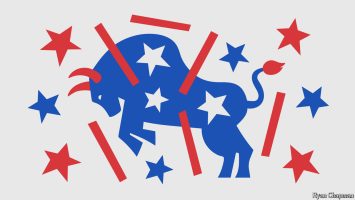
IT IS DIFFICULT for a democracy to spread its values abroad when it is undermining them at home. Joe Biden, America’s president, knows that all too well. In his presidential campaign in 2020 he promised to rejuvenate democracy around the world. In office he has spent nearly four years refuting false claims that he stole the election from Donald Trump. (More than half of Republicans still think that Mr Biden did not win in 2020.) Democracy around the world is not in great shape either.

Chart: The Economist
Surveys show that Americans’ trust in their system of government is hitting new lows. A democracy index created by EIU, our sister company, demoted America from a “full democracy” to a “flawed” one in 2016. It has kept that status ever since (see chart 1). America was once seen around the world as a standard-bearer for democracy. What went wrong?
EIU data suggest what aspects of democracy are weakest. The overall scores are based on five categories, each marked on a scale of one to ten (see chart 2). Even with Mr Trump’s baseless claims of voter fraud in the 2016 and 2020 elections, America still scores highly in its ability to hold legitimate elections. (Despite the pro-Trump insurrection before Mr Biden’s inauguration, America got the president that it voted for.) On political participation (ie, voter turnout) and electoral process and pluralism (ie, free and fair elections) America scores around nine points out of ten.
Instead, it is America’s political culture and the functioning of its government that pose the biggest problems. Within the culture category, America scores poorly on political polarisation and general support for democracy. A recent survey by Pew, a pollster, found that more than a quarter of Americans think that an autocracy—in which a leader can bypass Congress and the courts—would be a somewhat or very good form of government.
On government functionality, America’s score is weighed down by mistrust of elected officials and perceptions of corruption. The same survey by Pew found that more than 80% of respondents believed that most political figures “don’t care” about “what people like me think”. In Sweden, a full democracy, just 43% of people think that. Gridlock in Congress over big issues, such as control of the border and aid for Ukraine, probably undermines Americans’ sense of trust.
Polarisation and mistrust are connected: America’s increasingly divided electorate votes for increasingly extreme candidates. That encourages the perception among a majority of voters, at any given time, that the government is led by people who are not acting in their best interests. Just 40% of moderates say that there is a party in America that represents their opinions.
America’s downgrade to flawed-democracy status coincided with the election of Mr Trump. But the trend was in motion years before he assumed office. One survey from 2012 found that 80% of Democrats approved of Barack Obama compared with just 12% of Republicans—at that time the largest partisan gap for any president’s third year of office. The flaws are unlikely to fade if Mr Trump wins a second term. But, as EIU’s index demonstrates, American democracy will remain troubled regardless of who wins in November.■



